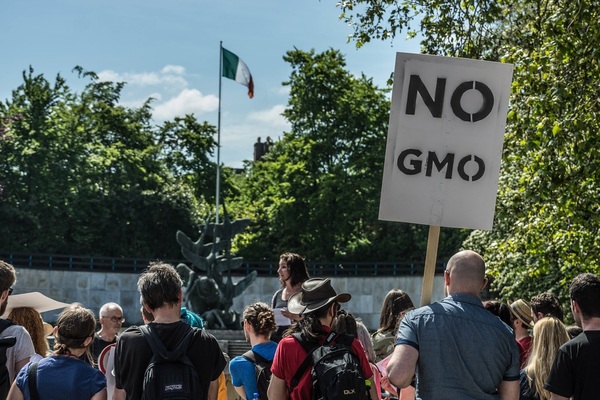
–>
October 29, 2022
Farmers across the world are desperate to grow genetically modified crops (GM) in their fields. So much so that in some countries farmers have bypassed existing bans on these crops and even made harvests from them.
‘); googletag.cmd.push(function () { googletag.display(‘div-gpt-ad-1609268089992-0’); }); }
Why do these farmers risk being prosecuted, and what compels them to grow GM food crops? The answer is straightforward: GM crops give higher yields, are resilient to deadly plant diseases, and can withstand tough environmental conditions.
Optimum Environmental Conditions Meet Advancement in Science
Conditions for food crops around the world are the best in all of human history. Elevated atmospheric CO2 concentration and warmer temperatures have greened the earth since the end of the Little Ice Age in the 17th century.
‘); googletag.cmd.push(function () { googletag.display(‘div-gpt-ad-1609270365559-0’); }); }
GM crop varieties are proven to be disease resistant, drought tolerant, and high yielding. This means more efficient farming and more food, at lower prices, for the world. GM crops also protect poor farmers against crop loss or excessive financial expenditure in purchasing pesticides and insecticides.
However, accessing these crop varieties is very difficult for farmers, as countries are still very slow in allowing their commercial cultivation.
Today the world produces more food crops than ever before. But we must not get complacent. Utilizing scientifically advanced GM food crop varieties will ensure global food security in the coming decades, helping us maximize the advantage of existing global climatic conditions — but only if governments permit them.
Propaganda Against Science
Many middle- and low-income countries have yet to approve GM crops despite them being declared safe by the world’s leading food regulatory bodies. Additionally, a wave of anti-GMO activism disrupts their adoption.
Sad to say, some citizens who mistakenly think GM crops are dangerous — including some Christians who think genetically modifying plants means “playing God with nature” — pressure governments to outlaw their use. Yet mankind has been modifying crops genetically for thousands of years, first through low-tech hybridization (cross-breeding), now through high-tech hybridization (physically moving some genetic material from one string of DNA and placing it in another). The result is the same in principle, but more predictable because we know which genes will be transferred. There is no basis in Christian ethics to oppose this. Rather, it is a valid enactment of mankind’s mandate in Genesis 1:28 to “subdue and rule” the earth and everything in it. And over 100 Nobel laureates have signed a statement vouching for GM crops’ safety.
‘); googletag.cmd.push(function () { googletag.display(‘div-gpt-ad-1609268078422-0’); }); } if (publir_show_ads) { document.write(“
“Then there is propaganda,” says a representative of Uganda Biosciences Information Centre. “Too many people, some of whom don’t even understand science, speaking against the technology. All these are blocking transition.”
One reason why GM food crops is banned in some countries is ill-informed activism that wrongly claims GM crops cause cancer. They do not. Some of the top food safety and regulatory bodies across the world have approved various GM crops for commercial cultivation. This includes the United Nations’ Food and Agricultural Organization, the Food and Drug Administration (FDA) in the U.S., Health Canada, and Australia’s Department of Health and Aged care. The claim that these are carcinogenic contradicts available scientific conclusions by experts. Indeed, more than a hundred Nobel prize-winning scientists and economists have signed a declaration calling for enhanced use of GM crops.
 In the book Starved for Science — with a foreword by former U.S. President Jimmy Carter and Nobel Peace Prize-winning agriculturalist Norman Borlaug — author Robert Paarlberg notes that “poor African farmers are denied access to productive technologies, particularly genetically engineered seeds with improved resistance to insects and drought.” He traces this obstacle to the current opposition to farm science in prosperous countries. “Having embraced agricultural science to become well-fed themselves, those in wealthy countries are now instructing Africans — on the most dubious grounds — not to do the same.”
In the book Starved for Science — with a foreword by former U.S. President Jimmy Carter and Nobel Peace Prize-winning agriculturalist Norman Borlaug — author Robert Paarlberg notes that “poor African farmers are denied access to productive technologies, particularly genetically engineered seeds with improved resistance to insects and drought.” He traces this obstacle to the current opposition to farm science in prosperous countries. “Having embraced agricultural science to become well-fed themselves, those in wealthy countries are now instructing Africans — on the most dubious grounds — not to do the same.”
But there is a growing rebellion among farmers.
The GM Rebellion by Farmers
In 2017, a small farmer in a remote part of India was caught by surprise when government officials visited his farm and took samples of his eggplant crops for lab testing. Later, the farmer was told that his crop — a disease-tolerant variant of eggplant — was illegal. The farmer’s crops were destroyed, causing immediate loss.
The farmer’s intention was to save his crops from diseases, reduce the cost of using pesticides, and make sure he had reasonable profit to make a living. An average eggplant crop requires spraying pesticide more than 30 times.
This farmer is not alone. In 2019, 1500 farmers in India orchestrated a “civil-disobedience movement.” They planted herbicide-tolerant cotton variety (HTBt Cotton) and disease-tolerant Brinjal (eggplant) varieties in open defiance of the ban by the government. Planting illegal GM crops can result in a five-year jail term and a fine of $1200. But it is estimated that “HTBt cotton has already been going on illegally in the country in about 30 per cent of the area.”
“Increasingly, it is the farmers, who bear the daily risks of agriculture, who are now speaking up in support of technologies that could reduce their risks and improve their wellbeing… These brave farmers are demonstrating their capacity to take on the risk society is imposing on them by denying them access to new technologies, including GM crops,” writes Barun Mitra, Director of the Liberty Institute.
Farmers in India lose billions of dollars in crops each year due to diseases and drought. This includes millions of farmers who live below poverty line. They deserve access to disease-resistant, and drought-tolerant GM crop varieties that reduce their risk of lost livelihood.
Besides, adopting GM crops will also improve the food security of a country whose population will be the highest in the world by 2030. India’s staple lentil variety, pigeon pea, can now be grown more easily and made more affordable if the country approves the disease-resistant and higher-yielding GM variant. Millions of children’s vitamin A deficiency can be avoided if the country approves vitamin-A fortified golden rice varieties already used in many countries.
Across the Indian Ocean, farmers in Africa have expressed similar intentions to use GM crops. African people are keen on utilizing some of the most amazing advancements in crop technology.
Currently in development are drought-tolerant maize (WE2115), banana that is resistant to bacterial wilt, a salt-tolerant rice that can survive low nitrogen and low water levels, blight-resistant potatoes, and a cassava variety (NASE 14) resistant to brown streak and mosaic diseases.
All are staple food crops in Africa and would bring immense benefit to the continent. They can be life-altering for millions of small-scale farmers in Africa who depend on their backyard crops to have food on their plates.
Any meaningful progress in strengthening global food security cannot be made without the use of scientifically advanced and efficient GM crop varieties. They will provide immediate relief to families who are below the poverty line, meet specific nutritional needs, and are a solution to long-lasting food security. Public policymakers need to know this — and they need to know voters know it.
Vijay Jayaraj is a Research Associate at the CO2 Coalition, Arlington, VA. He holds a master’s degree in environmental sciences from the University of East Anglia, UK and resides in India.
Image: William Murphy
<!– if(page_width_onload <= 479) { document.write("
“); googletag.cmd.push(function() { googletag.display(‘div-gpt-ad-1345489840937-4’); }); } –> If you experience technical problems, please write to [email protected]
FOLLOW US ON
<!–
–>
<!– _qoptions={ qacct:”p-9bKF-NgTuSFM6″ }; ![]() –> <!—-> <!– var addthis_share = { email_template: “new_template” } –>
–> <!—-> <!– var addthis_share = { email_template: “new_template” } –>







